|
|
|
Sort Order |
|
|
|
Items / Page
|
|
|
|
|
|
|
| Srl | Item |
| 1 |
ID:
177710
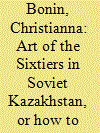

|
|
|
|
|
| Summary/Abstract |
The artists of the Sixtiers generation in Soviet Kazakhstan have typically been understood as the creators of an authentic Kazakh style. This article demonstrates that a web of constructed vectors helped consolidate art as ‘Kazakh’ in the 1960s and early 1970s. I argue that the Sixtiers mined the history of nomadic populations in Central Asia for site-specific cultural forms as a means to connect with an expanding art world and the global context of decolonialization. Neither wholly official nor countercultural, the Sixtiers produced a cultural milieu that stretched the limits of the sayable in late Soviet socialism and defined the margins of modernity with which Kazakh artists continue to contend.
|
|
|
|
|
|
|
|
|
|
|
|
|
|
|
|
| 2 |
ID:
099770
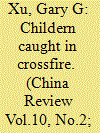

|
|
|
|
|
| Publication |
2010.
|
| Summary/Abstract |
This article with an observation of the imitations of Asian Cinematic aesthetics, especially John Woo's aesthetics of violence, in Contemporary Hollywood. The author points outs the fallacy of the binary between Hollywood filmmakers usually perceives as fantastic/other worldly in the Asian elements. The author uses John Woo as the primary example of Global affective cinema which not only features qing (feeling, affects, love) thematically but also relies on qing the guiding principle to intensify the emotional and effective power.
|
|
|
|
|
|
|
|
|
|
|
|
|
|
|
|
| 3 |
ID:
178135
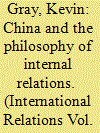

|
|
|
|
|
| Summary/Abstract |
Bieler and Morton’s Global Capitalism, Global War, Global Crisis makes an important and timely contribution to the academic study of the international political economy.1 Based on the philosophy of internal relations, the book seeks to challenge the ‘ontological exteriority’ that is typically posited between key elements of the international system, such as ideas, the social relations of production, the workplace, the ‘social factory’, and the market, state and inter-state system. While the authors draw on a range of theoretical resources and approaches, it is the historical materialism of Antonio Gramsci that provides the key intellectual resource for the numerous theoretical interventions made in the book. For example, Gramsci’s critique of economism and statology provides the basis of an insightful intervention into the structure-agency debate by emphasising the intersections between the social relations of production and class struggle. Gramsci’s theory of hegemony and the integral state, on the other hand, provides the basis of an understanding of the material structure of ideology. As such, Bieler and Morton further strengthen the case for the relevance of Gramsci’s writings not just for the field of International Political Economy but for social theory more broadly.
|
|
|
|
|
|
|
|
|
|
|
|
|
|
|
|
| 4 |
ID:
105926
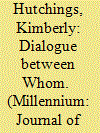

|
|
|
|
|
| Publication |
2011.
|
| Summary/Abstract |
There is a politics to the West/non-West distinction that is bound up with predominant models for dialogue in IR; rethinking these models of dialogue implies a new politics, and therefore also, I will suggest, a move away from the West/non-West binary as a way of characterising the participants in dialogic exchange oriented towards the expansive transformation of disciplinary imaginaries.
|
|
|
|
|
|
|
|
|
|
|
|
|
|
|
|
| 5 |
ID:
085282


|
|
|
| 6 |
ID:
102780
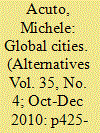

|
|
|
| 7 |
ID:
139466
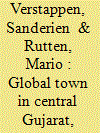

|
|
|
|
|
| Summary/Abstract |
Towns have been described as nodes of rural–urban mobility, while megacities have been described as hubs of international mobility. This paper uses the term ‘global town’ to describe a town as a hub of rural–urban and transnational migration. It draws attention to the connection between regional power dynamics, transnational migrants' ties with their home region, and urban transformation. Regionally-dominant groups can use a town to reproduce their rural power base, while less powerful communities can use a town to seek refuge from violence and marginalisation. These processes crucially affect the experiences of transnational migrants, who also participate in the transformation of the town when they ‘return home’ and buy property there, particularly after retirement. Our use of the term ‘global town’ is illustrated through a case study of Anand, Gujarat.
|
|
|
|
|
|
|
|
|
|
|
|
|
|
|
|
| 8 |
ID:
085325
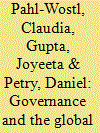

|
|
|
|
|
| Publication |
2008.
|
| Summary/Abstract |
Public policy on water has long been approached in the context of a locality, a country, or a river basin. However, scientific evidence now provides compelling arguments for adopting a global perspective on water management. This article argues that water governance today needs a multilevel design, including a significant global dimension. The discussion defines global water governance, highlights the implications for multilevel governance, and examines global water governance through the lens of governance typologies. The analysis along the categories of globalization/regionalization, centralization/decentralization, formality/informality, and state/nonstate actors and processes reveals that current global water governance is a fragmented, mobius-web arrangement. The article concludes by considering possible future trajectories of global water governance.
|
|
|
|
|
|
|
|
|
|
|
|
|
|
|
|
| 9 |
ID:
084300
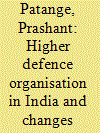

|
|
|
| 10 |
ID:
109863
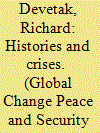

|
|
|
| 11 |
ID:
192191
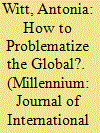

|
|
|
|
|
| Summary/Abstract |
International Relations (IR) has long been criticized for taking a particular (Western) experience as basis for formulating theories with claim to universal validity. In response, recent discussions have therefore centered on making IR ‘truly global’, that is, more inclusive and less parochial in its language and substance. But the concept of the global underpinning this discussion is both illusive and strongly contested. It requires problematization. But how? In this Forum, scholars discuss this question with a forward-looking agenda. Building on recent critical engagements with the question of the global as a concept in general and Global IR specifically, the authors ask how the global should be problematized in order to achieve a (more) progressive agenda for IR. They draw on different regional and disciplinary perspectives to both further the agenda of a less exclusive and racist discipline without falling into the trap of shallow inclusivity, and to discuss ways of problematizing the global without falling back into nativism or nationalism.
|
|
|
|
|
|
|
|
|
|
|
|
|
|
|
|
| 12 |
ID:
155179
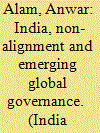

|
|
|
|
|
| Summary/Abstract |
India is a significant part of Rising Asia, which has attracted considerable international attention in recent years. Two decades of sustained economic growth along with its functional liberal democratic institution of governance has made India an emerging leading voice in matters related to the reform of institutions of global governance including the UN, International Monetary Fund (IMF), World Bank and other ‘global common’ issues such as ocean, air, space and Internet, security, trade and climate. This article attempts to highlight the emerging orientation and the policy shift in the Indian leadership towards the issue of its vision and shaping of emerging global political and economic order and argues that, contrary to the prevailing view, India continues to conduct its foreign policy within the broad normative order of discourse of non-alignment, which has served India’s national interest well, including its rising aspiration of becoming a global power. The article also reflects upon the domestic challenges and unstable regional dynamics that hamper its capacity to become a global player and share the responsibility expected from a global power.
|
|
|
|
|
|
|
|
|
|
|
|
|
|
|
|
| 13 |
ID:
080980


|
|
|
|
|
| Publication |
2008.
|
| Summary/Abstract |
Regional and global intergovernmental organizations have grown both in number and scope, yet their role and effectiveness as conflict managers is not fully understood. Previous research efforts tend to categorize organizations solely by the scope of their membership, which obscures important sources of variation in institutional design at both the regional and global levels. International organizations will be more successful conflict managers if they are highly institutionalized, if they have members with homogeneous preferences, and if they have more established democratic members. These hypotheses are evaluated with data on territorial (1816-2001), maritime (1900-2001), and river (1900-2001) claims from the Issue Correlates of War (ICOW) project in the Western Hemisphere, Europe, and the Middle East. Empirical analysis suggests that international organizations are more likely to help disputing parties reach an agreement if they have more democratic members, if they are highly institutionalized, and when they use binding management techniques
|
|
|
|
|
|
|
|
|
|
|
|
|
|
|
|
| 14 |
ID:
087683
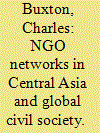

|
|
|
|
|
| Publication |
2009.
|
| Summary/Abstract |
Based on research carried out by INTRAC (International NGO Training & Research Centre) in 2006-2007 in four countries of Central Asia for Oxfam-Novib, the article investigates NGO networks and their international links in the context of current theory on civil society and global civil society. Three case studies of NGOs working in service delivery, community development and free media are examined to show the diversity of aims and the potential and challenges of networking in the region. Civil society advocacy at national and international levels is analysed with a fourth case study on the campaign conducted in Kyrgyzstan against joining the World Bank's Highly Indebted Poor Countries programme. This example shows a more radical, alternative mode of civil society activism. The article emphasizes the importance of national- and regional-level networking and poses the question of whether NGOs in Central Asia can shift from their current positions on the periphery of global movements and debates.
|
|
|
|
|
|
|
|
|
|
|
|
|
|
|
|
| 15 |
ID:
141357
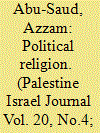

|
|
|
|
|
| Summary/Abstract |
The emergence of political religion/Islam did not occur in a void; U.S. policies in the region helped pave the way.
|
|
|
|
|
|
|
|
|
|
|
|
|
|
|
|
| 16 |
ID:
117730
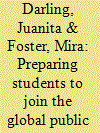

|
|
|
|
|
| Publication |
2012.
|
| Summary/Abstract |
Just as public policy was once debated over newspapers in Parisian cafes, today's global policy debates take place in the blogosphere and on social networks. Admission to the lettered city of the twenty-first century demands not just constant connectivity but also rapid comprehension and succinct writing. Preparing students to participate in the global public sphere requires supplementing their directed research skills with monitoring skills, then showing them how to communicate in public debate. In selected undergraduate International Relations courses at San Francisco State University, students hone monitoring skills by following news feeds in RSS feed readers and course management systems. Textbooks then become a source of context for understanding the latest developments in regional issues. Suggested Web sites and a Facebook forum provide students with access and encouragement to communicate with experts on course topics. By engaging online, students repurpose technologies and social skills from their daily lives for educational ends. Examination questions cover relevant current events, briefing papers replace term papers, and course assessment measures reward students for experimenting and improving throughout the semester. Because this approach to online participation and current events monitoring may be unfamiliar to students, the course design and simulation activities encourage students to draw on small group support while developing their individual skills and confidence.
|
|
|
|
|
|
|
|
|
|
|
|
|
|
|
|
| 17 |
ID:
172294
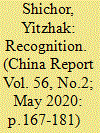

|
|
|
|
|
| Summary/Abstract |
This paper provides a framework for China’s gradual global integration. From historical exclusion, China became initially and partly incorporated to the world in the 1950s and 1960s while ignored by most of the countries. A quantitative breakthrough in the 1970s has led to a universal recognition, still formal and restricted throughout the 1980s and 1990s, making China a great power by the early twenty-first century. China’s rise and gradual integration in the international community is interpreted here based on Marx’s theory of ownership and Professor Charles Taylor’s theory of recognition. Both regard status as a property which is an outcome not just of a unilateral individual claim but of multilateral social relations. Adapted to the international society, these theories underscore China’s global integration. Therefore, China is now entitled to, and capable of, playing a more active and, moreover, leading global role, not just because of its unilateral claims and remarkable achievements, but also, and perhaps much more, because of its multilateral recognition—not in the formal diplomatic sense—of China’s entitlement and capabilities of doing it. Also, in addition to joining, and occasionally heading, international organisations, China introduced its One Belt One Road initiative as a unique contribution of a model for the West, and especially for less-developed countries. While it is post-Mao China’s domestic reform which attract most international attention and are regarded a revolutionary breakthrough with the past, the real and most innovative breakthrough is China’s integration in the world. Domestic reforms were undertaken throughout Chinese history; international integration is new and unprecedented.
|
|
|
|
|
|
|
|
|
|
|
|
|
|
|
|
| 18 |
ID:
084535
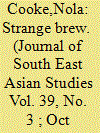

|
|
|
| 19 |
ID:
185034
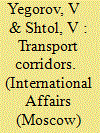

|
|
|
|
|
| Summary/Abstract |
DESPITE the multidirectional trends evident in the modern planetary landscape, overall, its emerging architecture is tending toward interconnectedness. The new civilizational image is universality and indivisibility. The world is becoming so interconnected that we can talk about a different level of scientific reflection expressed in Parag Khanna's vision of possibly establishing "Connectography" as an academic discipline, with the maxim "Connectivity is destiny" serving as its refrain
|
|
|
|
|
|
|
|
|
|
|
|
|
|
|
|
| 20 |
ID:
124409
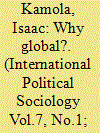

|
|
|
|
|
| Publication |
2013.
|
| Summary/Abstract |
This article examines the assumed factuality of globalization in light of its persistent conceptual incoherence. Through a diagnosis of five reoccurring ambiguities within the globalization literature, I argue that the concept of globalization lacks an empirical referent. Scholars writing on globalization overcome this absence by asserting that some things (the Internet, McDonald's, etc.) and not others (genocide in Rwanda, refugee camps, etc.) are essentially "global." It turns out, however, that who is positioned to posit some things (and not others) as "global," and therefore posit the foundation for a theory of globalization, is shaped by a highly asymmetrical political economy of knowledge production. In particular, some scholars-usually in North American and European universities-are materially better positioned to produce knowledge about globalization than many of their colleagues in postcolonial countries. The seemingly arbitrary positing of some things as "global," therefore, should be understood as a symptom of the highly unequal social relations in which knowledge about globalization is produced.
|
|
|
|
|
|
|
|
|
|
|
|
|
|
|
|
|
|
|
|
|